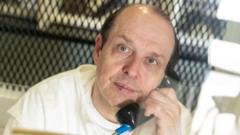In a dramatic turn of events, a Texas judge issued a restraining order that spared Robert Robertson from execution, illuminating the debate surrounding shaken baby syndrome and mental health issues in legal proceedings.
Last-Minute Legal Maneuver Saves Texas Father from Execution in Controversial Shaken Baby Case

Last-Minute Legal Maneuver Saves Texas Father from Execution in Controversial Shaken Baby Case
A Texas judge halts execution of Robert Roberson, raising questions about the validity of shaken baby syndrome convictions and highlighting concerns over mental health considerations in the criminal justice system.
In a breathtaking twist of fate, Robert Roberson, a Texas father sentenced to death for the 2002 death of his two-year-old daughter, Nikki Curtis, has received a temporary reprieve, just moments before his scheduled execution. The order was issued by a Travis County judge less than two hours before the capital punishment was set to take place, paving the way for Roberson to testify in an upcoming legislative hearing.
Roberson, who has maintained his innocence since his conviction in 2003, was the first individual in the United States to be placed on death row for murder charges related to alleged "shaken baby syndrome." Supporters argue that Nikki's death may have stemmed from complications related to pneumonia, not abuse. Prosecutors have disputed these claims, stating that new evidence does not negate the existing evidence of injury.
The temporary halt of Roberson's execution comes after a Texas House panel issued an unusual subpoena, compelling authorities to enable his appearance at a hearing scheduled for October 21. A bipartisan group of 86 lawmakers, prominent scientific experts, and even high-profile figures like bestselling author John Grisham had rallied to request clemency for Roberson, asserting that his conviction relied on outdated understandings of shaken baby syndrome.
Grisham vehemently criticized the impending execution, questioning the moral implications of executing an innocent man. "Robert’s case reflects a grave injustice," he stated emphatically. Moreover, Roberson’s autism, previously undiagnosed at the time of his daughter’s tragic death, has raised concerns about the use of emotional reactions in evaluating guilt in legal cases.
On the day of what was supposed to be his execution, the U.S. Supreme Court opted not to intervene, leaving the fate of Roberson in the hands of Texas Governor Greg Abbot. In his final plea, Roberson urged the governor to "do the right thing," asserting his innocence and recounting the events leading to his daughter's hospitalization.
Support from law enforcement members, including Brian Wharton, the detective who initially investigated the case, underscores the doubts cast on Roberson's conviction. Wharton expressed regret over his role in contributing to the wrongful incarceration of an innocent man.
Roberson’s case forms part of a larger critical examination of how the legal system approaches complex health matters, particularly the diagnosis of shaken baby syndrome—now increasingly referred to as abusive head trauma. Recent evaluations have suggested the necessity to broaden perspectives on injury causation before assigning culpability solely to abuse.
As this compelling story unfolds, the implications for the legal treatment of such sensitive cases remain profound, echoing broader concerns about the intersection of mental health and justice. With Roberson's execution momentarily halted, the conversation around potential reform continues to gather momentum in Texas and beyond.




















